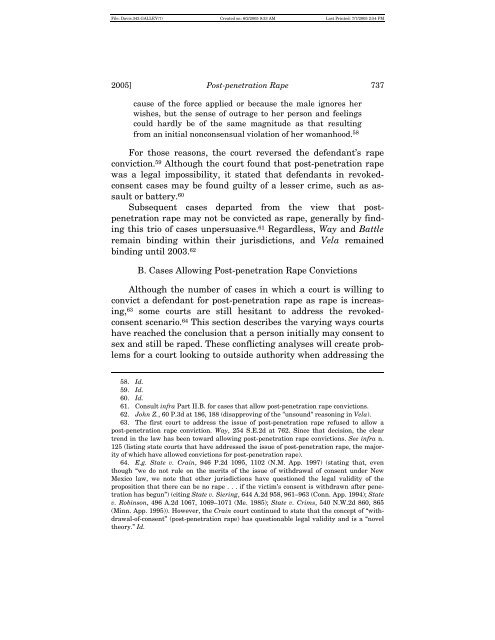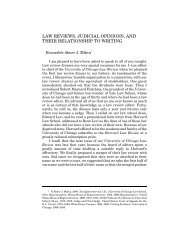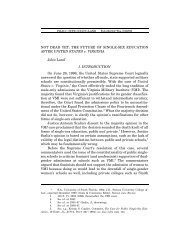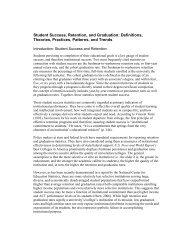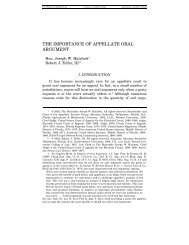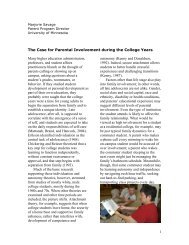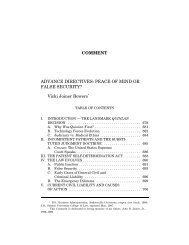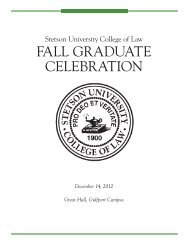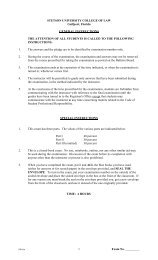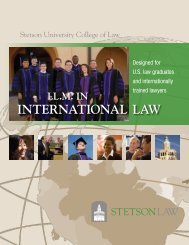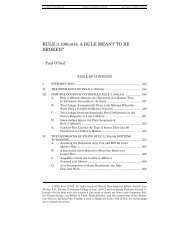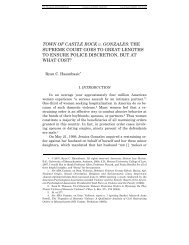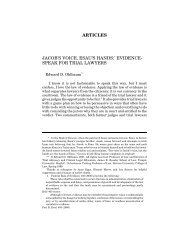the evolution of post-penetration rape law - Stetson University ...
the evolution of post-penetration rape law - Stetson University ...
the evolution of post-penetration rape law - Stetson University ...
Create successful ePaper yourself
Turn your PDF publications into a flip-book with our unique Google optimized e-Paper software.
File: Davis.343.GALLEY(7) Created on: 6/2/2005 9:33 AM Last Printed: 7/7/2005 2:54 PM2005] Post-<strong>penetration</strong> Rape 737cause <strong>of</strong> <strong>the</strong> force applied or because <strong>the</strong> male ignores herwishes, but <strong>the</strong> sense <strong>of</strong> outrage to her person and feelingscould hardly be <strong>of</strong> <strong>the</strong> same magnitude as that resultingfrom an initial nonconsensual violation <strong>of</strong> her womanhood. 58For those reasons, <strong>the</strong> court reversed <strong>the</strong> defendant’s <strong>rape</strong>conviction. 59 Although <strong>the</strong> court found that <strong>post</strong>-<strong>penetration</strong> <strong>rape</strong>was a legal impossibility, it stated that defendants in revokedconsentcases may be found guilty <strong>of</strong> a lesser crime, such as assaultor battery. 60Subsequent cases departed from <strong>the</strong> view that <strong>post</strong><strong>penetration</strong><strong>rape</strong> may not be convicted as <strong>rape</strong>, generally by findingthis trio <strong>of</strong> cases unpersuasive. 61 Regardless, Way and Battleremain binding within <strong>the</strong>ir jurisdictions, and Vela remainedbinding until 2003. 62B. Cases Allowing Post-<strong>penetration</strong> Rape ConvictionsAlthough <strong>the</strong> number <strong>of</strong> cases in which a court is willing toconvict a defendant for <strong>post</strong>-<strong>penetration</strong> <strong>rape</strong> as <strong>rape</strong> is increasing,63 some courts are still hesitant to address <strong>the</strong> revokedconsentscenario. 64 This section describes <strong>the</strong> varying ways courtshave reached <strong>the</strong> conclusion that a person initially may consent tosex and still be <strong>rape</strong>d. These conflicting analyses will create problemsfor a court looking to outside authority when addressing <strong>the</strong>58. Id.59. Id.60. Id.61. Consult infra Part II.B. for cases that allow <strong>post</strong>-<strong>penetration</strong> <strong>rape</strong> convictions.62. John Z., 60 P.3d at 186, 188 (disapproving <strong>of</strong> <strong>the</strong> "unsound" reasoning in Vela).63. The first court to address <strong>the</strong> issue <strong>of</strong> <strong>post</strong>-<strong>penetration</strong> <strong>rape</strong> refused to allow a<strong>post</strong>-<strong>penetration</strong> <strong>rape</strong> conviction. Way, 254 S.E.2d at 762. Since that decision, <strong>the</strong> cleartrend in <strong>the</strong> <strong>law</strong> has been toward allowing <strong>post</strong>-<strong>penetration</strong> <strong>rape</strong> convictions. See infra n.125 (listing state courts that have addressed <strong>the</strong> issue <strong>of</strong> <strong>post</strong>-<strong>penetration</strong> <strong>rape</strong>, <strong>the</strong> majority<strong>of</strong> which have allowed convictions for <strong>post</strong>-<strong>penetration</strong> <strong>rape</strong>).64. E.g. State v. Crain, 946 P.2d 1095, 1102 (N.M. App. 1997) (stating that, eventhough “we do not rule on <strong>the</strong> merits <strong>of</strong> <strong>the</strong> issue <strong>of</strong> withdrawal <strong>of</strong> consent under NewMexico <strong>law</strong>, we note that o<strong>the</strong>r jurisdictions have questioned <strong>the</strong> legal validity <strong>of</strong> <strong>the</strong>proposition that <strong>the</strong>re can be no <strong>rape</strong> . . . if <strong>the</strong> victim’s consent is withdrawn after <strong>penetration</strong>has begun”) (citing State v. Siering, 644 A.2d 958, 961–963 (Conn. App. 1994); Statev. Robinson, 496 A.2d 1067, 1069–1071 (Me. 1985); State v. Crims, 540 N.W.2d 860, 865(Minn. App. 1995)). However, <strong>the</strong> Crain court continued to state that <strong>the</strong> concept <strong>of</strong> “withdrawal-<strong>of</strong>-consent”(<strong>post</strong>-<strong>penetration</strong> <strong>rape</strong>) has questionable legal validity and is a “novel<strong>the</strong>ory.” Id.


